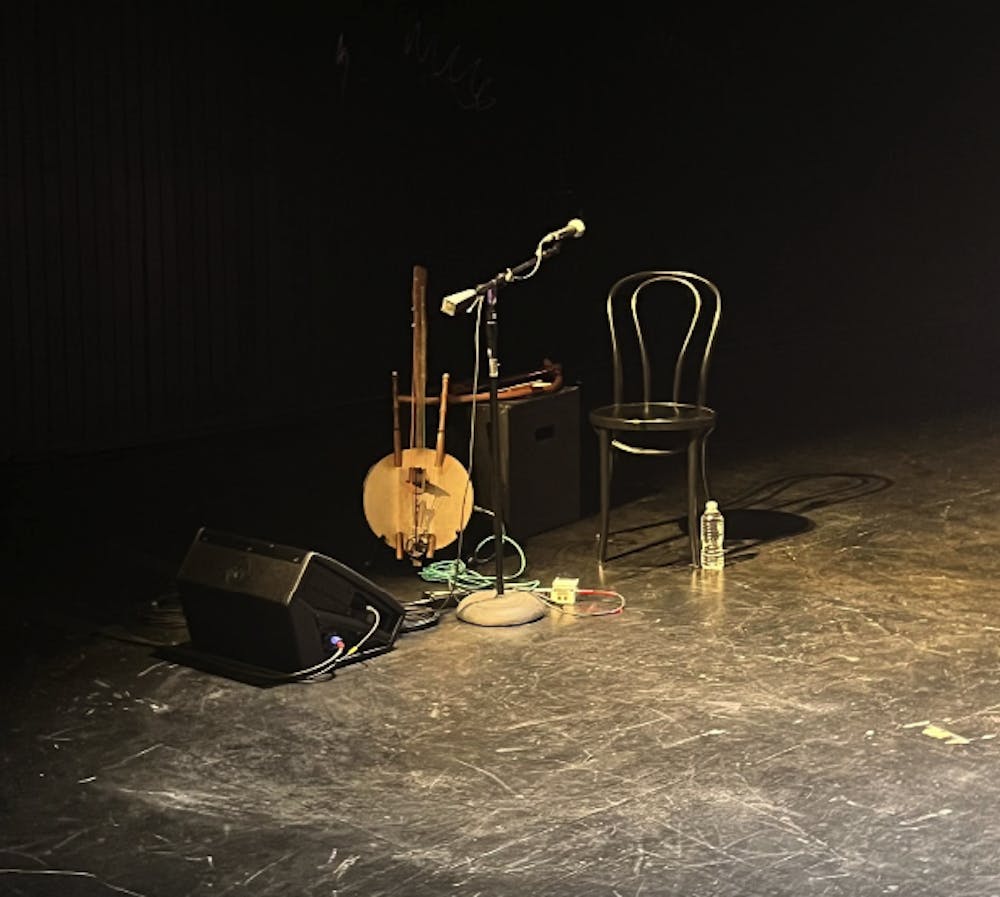The play “Traces,” presented in the Marie and Edward Matthews ’53 Acting Studio on Sept. 19 and 20, began with the melodic sound of the kora, a West African string instrument. The lights illuminated the stage, spotlighting the musician Simon Winse. The music was a trance-inducing force that I felt I could listen to for hours. When actor Étienne Minoungou joined on stage and began speaking, I was reminded that the play was in French, a language I only know a handful of words in. I was a bit lost during his preface of the show, when the subtitles had yet to appear; as someone who studies Spanish, I unsuccessfully tried to latch onto some familiar words.
When the play started, helpful subtitles appeared on a screen above. From then on, I alternated my focus from the actors performing in French in real time to the English subtitles so I could make sense of the story. Then something interesting happened — I started relying on the subtitles less and less.
In the span of an hour, I did not suddenly begin to understand French. Rather, I started to recognize the meaning of some words, their connotations in the play, and the emotions they provoked. The emotion of Minoungou was what really connected me and the language. I could feel his anguish, his exasperation, his hope. I started to follow the story of the African slave trade and its effect on the continent — a story I knew well from history classes, but one I had never experienced in such a way before.
During the performance, Minoungou occasionally posed questions to the audience, directly looking at specific people. I wasn’t sure if it was scripted, but there were no subtitles during this part, so I was at a loss; only the French speakers in the audience could respond. It was an amazing way to include audience participation, and I was captivated even though I did not understand the exchange.
At one point, he posed a question to the front row, where I was seated. We locked eyes as he waited for a response. My “answer” was a smile and a nod. Luckily, that was sufficient — or perhaps, he sensed my hesitation and graciously continued. Surprisingly, I did not feel as uncomfortable about the situation as I had expected. Actually, engaging with the language added to my fascination. I could not speak a word of French, but after that, I felt more included in the experience. I was not only watching a show; I was in it.
“Traces,” which is inspired by the lyrical text of the same name by Senegalese philosopher and poet Felwine Sarr, ends with a call to action. During the final moments, I focused more on the expressions of the performers rather than the words on the screen. While I could not recount every word, I came to understand the intent behind them. Yet, when the show concluded, I was not entirely sure that it was done. For me, there was no definite ending. First, the actor’s portrayal of optimism for future change was a message that had persistent continuity. Mostly, however, hearing the play in French created a certain temporal fluidity. I was not overly caught up on every word, simply because I did not understand them. Instead, I moved with the story at my own pace. Although it was slow, it made every word I read, heard, and felt even more meaningful.
Before the play began, as I walked into the corridor of the acting studio, it was intimidating and humbling to hear everyone around me speaking in French. However, by the end of the show, I felt the discomfort was necessary.
When I watch TV shows in Spanish, I can usually grasp the words or rewind if necessary, but interacting with a different language during a live performance was an entirely unfamiliar experience. I know that experience will not end here, and I am excited to continue my immersion into different languages by exploring various art forms. I also challenge you, the reader, to engage with art that pushes you out of your comfort zone.

While the last show for the season was on Sept. 23, the Princeton French Theater Festival is annual, going on its 12th year, so you will surely have an opportunity to experience the arts in another language, either with this program or others.
Even after the show ended, I remained transfixed by the words and the music. One phrase that was repeatedly mentioned was “et le temps a passé,” meaning “and time passed.” Indeed, as time passed during the show, I emerged with a different feeling than when I had entered ― accomplissement.
Regina Roberts is a contributing writer for The Prospect at the ‘Prince.’ She can be reached at rr8156@princeton.edu, or on Instagram at @regina_r17.









